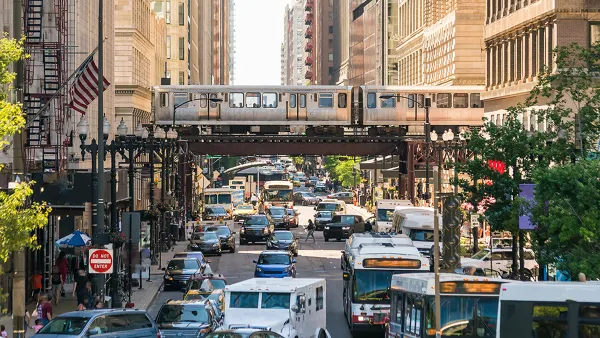An idea approved in 2019 which spent the last two years stuck in Trump and Covid limbo, will only now begin a slow march toward final approval.

"The MTA confirmed on Friday that it will take 16 more months to complete the required environmental assessment for congestion pricing," reports Dave Colon.
The idea of congestion pricing for a large section of Manhattan (a system also known as cordon pricing) has been floating on the fickle winds of political fortune for well over a decade. In 2008, the New York State Assembly killed a plan by then-New York Mayor Michael Bloomberg to implement cordon pricing in Manhattan with the help of federal funding made available during the Bush administration—money that eventually went to Los Angeles to fund the first toll lanes in Los Angeles County on several major freeways.
Congestion pricing in New York City seemed revenant in March 2019, when a rare alignment between then-Governor Andrew Cuomo, Mayor Bill de Blasio, and the New York State legislature broke the political logjam for congestion pricing, eventually winning a green light in April of the same year.
But by February 2020, the story had shifted to the obstacles presented by the Trump administration, before Covid added a new, larger obstacle to the ongoing delays caused by the Trump administration.
So what explains this latest setback? An agreement between the transit agency and the federal government, the MTA, the New York State DOT, and the New York City DOT has laid out a 16-month public outreach process: "a timeline that includes months of public meetings and briefings to determine if reducing driving into the central business district of Manhattan will be good for the environment and for long-suffering communities of color that have borne the brunt of decades of damage from the automobile."
As noted by Colon, the MTA officials had previously stated that the Environmental Assessment for congestion pricing in Manhattan would take only a few months. Mayor Bill de Blasio has since blasted the 16-month timeline as "ridiculous."
FULL STORY: MTA, Feds Promise Congestion Pricing Won’t Start For A Long, Long Time

Planetizen Federal Action Tracker
A weekly monitor of how Trump’s orders and actions are impacting planners and planning in America.

Chicago’s Ghost Rails
Just beneath the surface of the modern city lie the remnants of its expansive early 20th-century streetcar system.

Amtrak Cutting Jobs, Funding to High-Speed Rail
The agency plans to cut 10 percent of its workforce and has confirmed it will not fund new high-speed rail projects.

Ohio Forces Data Centers to Prepay for Power
Utilities are calling on states to hold data center operators responsible for new energy demands to prevent leaving consumers on the hook for their bills.

MARTA CEO Steps Down Amid Citizenship Concerns
MARTA’s board announced Thursday that its chief, who is from Canada, is resigning due to questions about his immigration status.

Silicon Valley ‘Bike Superhighway’ Awarded $14M State Grant
A Caltrans grant brings the 10-mile Central Bikeway project connecting Santa Clara and East San Jose closer to fruition.
Urban Design for Planners 1: Software Tools
This six-course series explores essential urban design concepts using open source software and equips planners with the tools they need to participate fully in the urban design process.
Planning for Universal Design
Learn the tools for implementing Universal Design in planning regulations.
Caltrans
City of Fort Worth
Mpact (founded as Rail~Volution)
City of Camden Redevelopment Agency
City of Astoria
City of Portland
City of Laramie





























